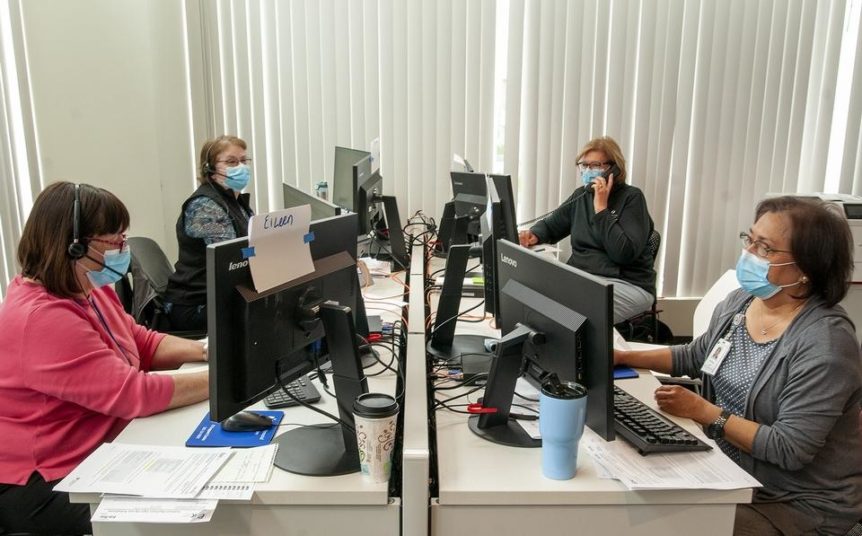View story at telegram.com
By Cyrus Moulton
Photo: Rick Cinclair
WORCESTER — The rooms are full of UMass Memorial Medical Center nurses and doctors at the front lines of treatment for the coronavirus.
But they’re practicing social distancing — because, in fact, those front lines are phone lines.
“The whole triage center is designed to help anyone with questions about COVID-19 … and we try to deal with a lot of people here, not in the emergency room,” said Jonna Dube, senior director of ambulatory services at UMMC. “We’re really the experts now on coronavirus.”
The UMass Memorial COVID-19 nurse triage center was established March 17 at Mercantile Center, 100 Front St., as a place where about 40 nurse practitioners, physician assistants, registered nurses and doctors could field questions from, and deliver test results for, potential coronavirus patients.
The center fields calls coming in from throughout the UMMC system — from UMMC clinics, from operators at the Medical Center campuses and Marlboro Hospital, from primary care clinics with patients who have questions or need testing, and from the city’s essential employees.
A hotline staffed by physicians has also been added as a resource for providers with questions about clinical protocols and who are seeking information.
In addition, calls go out: The “results room” of the triage center calls all patients with COVID-19 test results — whether positive or negative — from tests ordered in the tented testing site or at any one of the system’s emergency departments.
The triage center is one way that the hospital system is redeploying staff in the fight against coronavirus.
Dr. Doug Groves is normally a primary care physician at UMass Memorial. But with a decrease in clinical work because of the virus outbreak, he volunteered to work at the triage center.
“I like seeing patients, but really feel like I’m making a difference now here,” Groves said. “I’m still talking with patients; it’s just over the phone.”
Nurse practitioner Elin Kienitz-Bell agreed. She normally works in the lung and allergy unit.
“It’s great to work where the need is, and this is the area that needs help right now,” Kienitz-Bell said. “It’s great that we can give patients the information they need and keep them safe at home.”
Dube, Kienitz-Bell and Groves said most of the people they have tested turned out to be negative.
“But every day we get more positives,” Dube said.
“It’s going up, but slowly, which is encouraging — cautiously encouraging,” Groves added.
And the vast majority of the positive patients are not acutely ill.
Groves said there were only one or two people in the last week that he recommended be picked up by an ambulance, and probably half a dozen cases where the patient was advised to drive themselves to the emergency room.
Most times, Groves said, he will go over symptoms the patient may be experiencing and explain the CDC guidelines. He acknowledged that a few people have not understood the magnitude of the virus and how contagious it is. Groves said he also answers lots of questions.
“A lot of people ask when they are going to be better,” Groves said, noting that the answer is variable. Some report feeling better within days, others within two or three weeks. “A lot of people ask, ‘What do I do about other family members?’ … some are worried about their employment and need a confirmation that they have the virus.”
Whether a patient can catch coronavirus a second time is also a frequent question.
“The unofficial answer is it is thought they will have immunity based on the behavior of other viruses, but the studies aren’t complete yet,” Groves said.
And while it’s not quite the same busyness or energy as an emergency room, the triage center is certainly humming.
Last week, the center saw 3,530 outbound calls with an average duration of 3 minutes, 59 seconds. It also fielded 272 inbound calls to nursing, and 88 inbound calls to physicians, according to UMMC.
The call volume is also increasing.
“We made 700 calls (Wednesday),” Dube said. “We think that the peak is in the next two weeks, and we want to prepare for that. I don’t think more people will be in the center but expect more tests being ordered and more results to call.”
Before excusing himself to go back to the phones, Groves added this: “We’ll have less downtime.”

